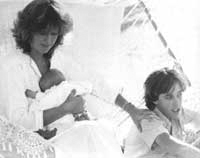|

Kuki
Gallmann: Living the African Dream
By
Tom Kertes
Not
too many people live a life that is fascinating enough to have
an Academy-Award winning film based on it. But, Kuki Gallmann,
a person clearly driven to gain a genuinely meaningful life, is
one of those rare people.
“Kim
Basinger, (who won the Best Actress Oscar for the role) was good
with the script she had,” says Gallmann, whose amazing story is
told in the film I Dream of Africa. “But the script wasn’t
too good.”
The film was based on Gallmann’s autobiography, now translated
into over 20 languages. “The film is a film,” she says. “But the
book was the real story.”
And, what a story it was! Gallmann, who used to dream about Africa
ever since she was a little girl and confesses to having read
“every available book about it”, first visited the continent as
a teenager when she traveled to the Sahara Desert with her father.
She visited Africa again in 1970 and after having fallen deeply
in love with the land she moved to Kenya with her husband and
son in 1972.
Two years later, the family bought Ol Ari Nyiro, a 100,000 acre
cattle ranch in northern Kenya with the largest available wildlife
of black rhino–as well as a plethora of elephant, buffalo, and
leopard–in all of Africa. Around 1980, as Kenya encountered a
serious poaching problem from the north (Somalia), the family
hired a security force of over 30 rangers to secure the elephants
and rhinos.
“This
was the first private anti-poaching squad anywhere,” says Gallmann.
“The situation with the animals was truly tragic. It was also
profoundly life-changing for me as it made me become very deeply
involved in conservation of wildlife.”
In March of 1980, Gallmann encountered great tragedy in her own
life: her husband Paolo died in an auto accident while transporting
a crib for his unborn daughter to his home. Then three years later
her 17-year-old son, Emanuele, a passionate herpetologist, was
killed on the eve of leaving for Stanford University while attempting
to extract venom to prepare serum from a viper.
“They
were both so deeply involved with the animals and the land,” says
Ms. Gallmann. ”So, in their honor—in order to make their journey
through life meaningful–I decided to dedicate my life and resources
to saving the environment of Kenya and started the Gallmann Memorial
Foundation.”
Established in 1984, the Foundation carried the specific mandate
of creating a ranch that would demonstrate the harmonious coexistence
of man and the environment and of exploring new ways of combining
development and conservation. Among other things, Gallmann created
a Black Rhino Sanctuary and a Wildlife Preserve on the ranch.
Still, the number one pride of the Foundation has become the Laikipia
Wilderness Centre for Environmental Education, due to its wide-reaching
impact.
“After
losing my son, I wanted other children–especially the children
of Africa who cannot afford to go to National Parks–to experience
the pride and marvel of learning about their own environment,”
says Gallmann. “And I also wanted them to learn about improving
conservation and introduce them to the notion of environmental
stewardship.”
Gallmann explained that she wrote I Dream of Africa because
she “wanted to tell the story as it happened. It may read like
a novel but it’s all real. And the pain was overcome with positive
action–this is what people need.”
“There
is a common denominator among parents who have lost children,”
said Gallmann. “And, the way in which I spoke about it created
a resonance in many hearts. I wanted to speak of the value of
family, solidarity, friendship, and a life of simplicity closer
to nature.”
“And
I wanted to speak about our responsibility to do something to
protect the earth.”#
Education Update, Inc., P.O. Box 20005, New York, NY 10001. Tel:
(212) 481-5519. Fax: (212) 481-3919. Email: ednews1@aol.com.
All material is copyrighted and may not be printed without express consent of
the publisher. © 2001.
|

